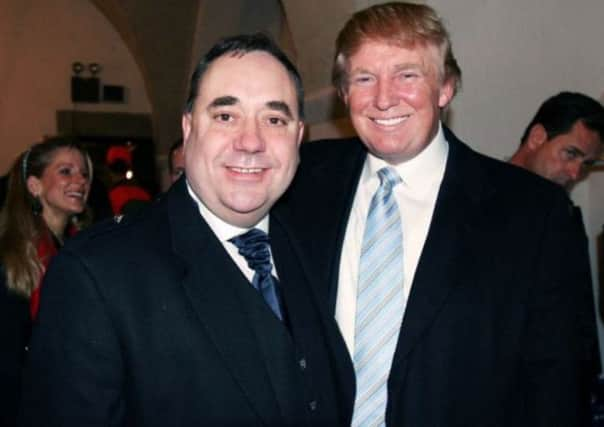Brian Monteith: Time to get down to business and deal with Trump


To answer either of those questions requires an analysis of Trump’s victory that goes far further than the predictably reactionary and base outpourings of the self-described progressives who were praying for a Hilary Clinton victory. Two reasons behind the Trump triumph say a great deal about the failure of a Democratic Party that has been captured by Corporate America, Wall Street and crony capitalism.
The first is how it is not hard to find on social media or in broadcast interviews the many people who were supporters of Bernie Sanders, Hilary Clinton’s left-of-centre opponent for the Democratic nomination, who decided to vote for Trump to achieve change.
Advertisement
Hide AdAdvertisement
Hide AdFor them Clinton was Wall Street lobbying personified, she had the backing of the big corporations and the mainstream liberal media and would deliver more of the same status quo that had left so many Americans behind. Sure, Trump has many faults, but in the solitude of the polling booth his name was presented next to Hilary Clinton’s, not Mother Theresa’s, the result being that their personal prejudices, questionable behaviour and poor judgment calls cancelled each other out.
The second contributory factor is that the attacks of Trump’s opponents often served to strengthen him. By attacking his politically incorrect honesty rather than his weakness on policy and political inexperience his Republican competitors in the primaries and then in the election itself built the perception of a Presidential candidate who was independent of the party machine. This was attractive to Tea Party followers that have been at war with the Washington establishment for the last decade and distrust the dealmakers on Capitol Hill. It reminded them of Ronald Reagan.Likewise when Democrats attacked Trump’s great wealth not only were they railing against the American Dream they were also managing to strengthen the hope that he would be resistant to corporate lobbying, making him attractive to some Sanders supporters looking for a candidate that could not be bought. Obama had raised more corporate money than McCain in 2008 or Romney in 2012 but for Trump his independence of Wall Street and Washington offered great strengths against Clinton, whom Michael Moore had branded a “Corporate Shrill”.
So it was that a billionaire could be attractive to ordinary men and women, his often intentionally offensive anti-Mexican comments did not stop him winning more Latino votes than Romney managed when he reached out to them four years before, and his past sexual behaviour could be more forgivable than that of the husband of his opponent to a large and voluble following of women.
Understanding these aspects of the election gives us clues as to what to expect from the Trump presidency.
Firstly, being independent of party and the corporate machine should allow Trump to appoint those that he believes will deliver on his promises about jobs, economic growth and immigration. Climate change skepticism looks to be the first winner following the appointment of Myron Ebell of the Competitive Enterprise Institute to Trump’s transition team.
The free ride on the back of US taxpayers that so many Nato members have enjoyed for decades will also come to an end, the bonus being that forced increased defence spending by European nations must result in more defence related jobs on both sides of the pond.
In international affairs the alarm about a third world war caused by Trump Tweeting inane insults and having a twitchy finger on the nuclear button runs contrary to the prospect that the real Donald Trump will want to achieve a practical relationship with Vladimir PutinTurning to our own domestic scene, Nicola Sturgeon’s self-indulgent pre-election grandstanding in comparison to that of the measured tones of Prime Minister Theresa May has shown her to be ill-judged and ignorant of diplomacy when Scotland required an open and neutral approach. Imagine what might have been if Alex Salmond had not fallen out with the President elect? It would not be Nigel Farage who would be Trump’s éminence grise but Alex himself.
Now Scotland – thanks to the SNP’s posturing – has much bridge building to do. A letter to America will not be enough.
Advertisement
Hide AdAdvertisement
Hide AdFor the UK the prospects are far more propitious. With Trump looking to change the nature of commerce the timing of our Brexit could not be better. Being free to strike our own free trade deals with other countries, which we could not do inside the EU Single Market and its protectionist Customs Union, gives us the opportunity to lead a free trade alliance with the likes of Australia, Singapore and Switzerland – while reaching an accommodation with the US itself. Trump will, I believe, prove to be a deal maker.
So it is time to get down to business and strike up the deals while Trump is minded for us to be at the front of the queue.
Brian Monteith is a director of Global Britain